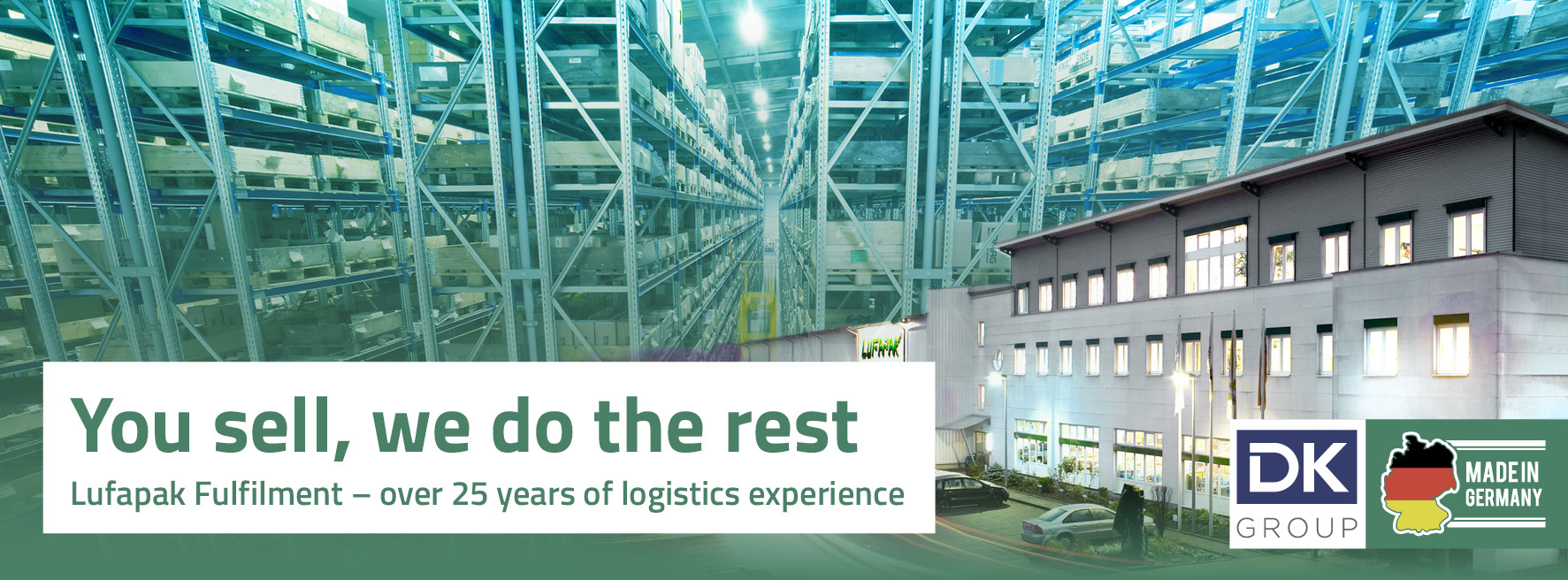sales@lufapak.de +49 2631/384-0 Contactform
E-fulfilment
What is e-fulfilment? Definition and basics
E-fulfilment refers to the outsourcing of logistical processes in online retailing after an order has been completed. The term combines e-commerce with fulfilment, where the latter encompasses the entire process of order processing. With this solution, a specialised service provider takes on all or selected logistical tasks that normally arise after the click on the buy button. Modern eFulfilment systems enable seamless integration into existing shop structures.
The basic idea is to transfer time-consuming and complex logistics processes to experts so that retailers can concentrate on their core business. E-commerce fulfilment typically includes warehousing, picking, packing, shipping and returns management. The difference to traditional logistics lies in the specific focus on the requirements of e-commerce with its characteristic individual shipments and high returns rates.
For online retailers, the use of e-fulfilment online services means a considerable relief. They do not have to build and maintain their own logistics infrastructure. Instead, they benefit from the expertise and economies of scale of specialised providers. This also enables smaller online shops to establish professional logistics standards and keep up with larger competitors.
E-fulfilment offers decisive advantages, especially for fast-growing companies. As the number of orders increases, there is no need for a company to extensively expand its own logistics capacities. The service provider flexibly adjusts the required resources to the current order volume.
The core components of fulfilment in e-commerce
E-commerce fulfilment consists of several interlocking process steps. It all starts with professional warehousing. The online retailer’s products are stored in the fulfilment service provider’s warehouses. Modern providers rely on automated storage systems with precise inventory management and optimal use of space. This ensures that an overview of available goods and their condition is always available.

After an order is received, the picking process begins. Employees or automated systems remove the ordered items from the warehouse and prepare them for shipment. This process must be particularly efficient in order to ensure short delivery times. The products are then packed, taking care to ensure adequate protection of the goods and an appealing appearance. Many e-fulfilment providers also offer customised packaging material with the retailer’s branding.
The actual shipment is another key component. Here, fulfilment service providers work with various logistics partners to optimise shipping routes and costs. Thanks to high shipping volumes, they can often negotiate more favourable conditions than individual retailers. In addition, returns management should not be underestimated. Returns are accepted, checked and either returned to storage or processed in some other way.
Modern eFulfilment solutions integrate these components into a single, comprehensive system. Order data is automatically transmitted via interfaces to the online shops and the current status of each shipment is reported back.
The advantages of eFulfilment for online retailers
Outsourcing logistics processes through eFulfilment offers online retailers numerous strategic advantages. First of all, concentrating on the core business enables a significant increase in efficiency. Instead of investing time and resources in warehouse management, packaging and shipping, retailers can focus on product development, marketing and customer care – areas that directly promote growth.
Cost savings are another major advantage. By using the infrastructure of a specialised service provider, there is no need for significant investments in your own storage space, technical equipment and personnel. In addition, fixed logistics costs are converted into variable costs that are based on the actual order volume. This creates financial flexibility and reduces business risk.
The scalability of e-fulfilment solutions is particularly valuable. During seasonal peaks or periods of general growth, logistics capacities can be easily adjusted without the retailer having to expand. Conversely, there are no oversized fixed costs for unused resources during weaker periods.
The professionalism of specialised providers also improves the quality of the shipping process. Shorter delivery times, more careful packaging and more efficient returns management noticeably increase customer satisfaction. This in turn strengthens customer loyalty and promotes positive reviews – crucial factors for sustainable success in e-commerce.
E-fulfilment or in-house logistics: making the right decision
The decision between e-fulfilment and in-house logistics depends on a variety of company-specific factors. Smaller online shops with a limited range and manageable order volumes can often handle their logistics themselves initially. However, as their success grows, their logistical requirements increase exponentially, quickly pushing in-house logistics to its limits.
A careful cost-benefit analysis is crucial to the decision-making process. Not only the direct costs for warehousing, personnel and packaging material must be taken into account, but also opportunity costs. Time spent on logistics processes is time lost for strategic tasks and growth measures. In addition, professional logistics requires specific know-how that must first be developed.
A middle way consists in the partial outsourcing of certain logistics processes. For example, only returns management or the storage of special products could be transferred to an e-commerce fulfilment service provider. This hybrid solution enables a step-by-step transition while maintaining direct control over central processes.
Specific product requirements should not be neglected. Items with special storage or handling requirements, such as food or hazardous goods, often require specialised fulfilment partners. The same applies to high-quality or highly customised products that require special care during packaging.
Selecting the perfect eFulfilment provider
When choosing a suitable e-fulfilment provider, several criteria should be carefully examined. The location of the logistics centre plays a crucial role in determining delivery times. Ideally, the warehouse should be located near the main sales markets to ensure short transport routes. For retailers operating internationally, a provider with several strategically distributed locations is recommended.
The technical infrastructure of the service provider deserves special attention. Modern warehouse management systems and seamless interfaces to your own online shop are essential for smooth operations. Check whether the provider supports all relevant shop systems and marketplaces and how inventory updates are carried out in real time.
Flexibility in the face of fluctuating order volumes is a sign of a reliable partner. Ask how the service provider handles seasonal peaks and what resources are available for short-term volume increases. Also, look for transparent pricing models with no hidden costs. Some providers charge a basic fee for storage plus variable costs per order, while others work with all-inclusive packages.
The scope of services should precisely match your requirements. Do you only need the core services or additional services such as product finishing, gift wrapping or special shipping options? The quality of customer service and the speed of response to problems are other important factors that often only become apparent when you need them. Therefore, ask for references and testimonials from other customers.
International e-fulfilment: eFulfilment EU and global opportunities
International trade offers enormous opportunities for growth, but it also presents online retailers with complex logistical challenges. Within the European Union, eFulfilment EU makes cross-border shipping considerably easier. With strategically placed logistics centres in various EU countries, delivery times can be shortened and shipping costs optimised. Centralised warehousing in countries such as Germany or the Netherlands is particularly advantageous, from where many European markets can be served within 24-48 hours.
The different tax regulations pose a particular challenge. A specialised e-fulfilment provider handles the correct processing of VAT for different EU countries and ensures compliance with country-specific packaging and labelling regulations. This minimises the risk of delays or problems at customs.
Beyond the EU, global eFulfilment networks offer the opportunity to efficiently serve remote markets as well. Using local warehouses in key markets such as North America or Asia can reduce international shipping costs and shorten delivery times. This increases competitiveness compared to local providers and improves the shopping experience for international customers.
Adapting to local conditions is particularly important in global e-fulfilment. This includes preferred payment methods, country-specific packaging and cultural differences in customer service. Professional providers advise on these aspects and help to make international expansion a success.
Technological aspects of e-fulfilment online
The technological basis for modern e-fulfilment online solutions is provided by high-performance warehouse management systems (WMS). This software controls all warehouse processes, from the optimal placement of goods and efficient picking to inventory monitoring. Advanced systems use algorithms to minimise walking distances and accelerate processing. This not only reduces costs, but also significantly lowers the error rate.
Seamless interfaces between the e-fulfilment system and the various online shops are the backbone of a successful implementation. These integrations ensure that orders are automatically transmitted, stocks are updated in real time and tracking information is forwarded directly to customers. Most service providers offer standardised plug-ins for common e-commerce platforms such as Shopify, WooCommerce or Magento.
Automation is becoming increasingly important in e-fulfilment. Robotic picking, automated conveyor belts and self-driving transport vehicles significantly increase efficiency. These technologies quickly pay for themselves, especially with high order volumes. The use of artificial intelligence is also noteworthy, for example, to predict order peaks or to dynamically adjust storage capacities.
Mobile applications enable retailers to view their e-commerce fulfilment processes at any time. They can check stock, view order status or process problems while on the go. This transparency builds trust in the outsourced process and allows for quick responses to unforeseen events.
Understanding and optimising e-fulfilment costs
Understanding the cost structure of e-fulfilment is crucial for optimal budget planning. Typically, storage costs are incurred, which are calculated based on the space used or the number of storage locations. In addition, there are picking fees per order as well as packaging and shipping costs. Many providers also charge setup fees for integrating the online store and monthly fees for system usage.
A precise analysis of your own product structure is crucial for optimising costs. High-value, low-volume items are particularly suitable for eFulfilment, as the storage costs are low in relation to the value of the goods. For bulky products with a low value, on the other hand, the fulfilment costs can eat up a significant portion of the margin.
A clever inventory planning helps to avoid unnecessary storage costs. Modern forecasting methods enable a precise prediction of the required quantities, which can reduce excessive inventories. At the same time, the length of time that products spend in storage should be optimised, as long storage times incur additional costs.
Negotiating skills when concluding a contract can lead to significant savings. Many e-commerce fulfilment providers offer scaled pricing models in which the costs per order fall as the volume increases. Seasonal business models should also pay attention to flexible contract designs that provide for reduced basic fees in times of low demand.
Successful integration of e-fulfilment into your corporate strategy
The strategic integration of e-fulfilment begins with a comprehensive analysis of your own business processes. First identify critical areas where outsourcing promises the greatest added value. Consider not only obvious factors such as cost and time savings, but also indirect effects on customer satisfaction and growth potential. A step-by-step implementation makes it possible to gain experience and continuously optimise processes.
Close coordination between marketing, sales and fulfilment is crucial for success. Advertising campaigns and sales promotions must be coordinated with logistical capacities to avoid bottlenecks. Inform your e-fulfilment online partner about planned campaigns in advance so that they can plan the appropriate resources. Joint forecasts and regular coordination meetings form the basis for smooth cooperation.
Use the freedom gained through e-fulfilment for strategic tasks. Invest the freed-up resources in areas such as product development, customer retention or opening up new markets. Outsourcing of logistics should not be viewed only as a cost factor, but also as a strategic lever that opens up new business opportunities.
Regular monitoring of the key figures enables continuous optimisation of the e-fulfilment processes. Pay particular attention to delivery times, error rates and customer satisfaction. Transparent reporting systems help to identify weaknesses at an early stage and to initiate improvement measures together with the service provider.
Contact us now and get advice

